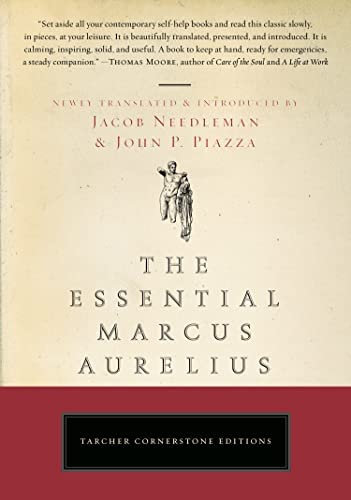Newly released
This book is new and will be uploaded as soon as it becomes available to us and if we secure the necessary publishing rights.

The Essential Marcus Aurelius Book PDF
(0)
Author:
Marcus AureliusNumber Of Reads:
73
Language:
English
Category:
Social sciencesSection:
Pages:
105
Quality:
excellent
Views:
1121
Quate
Review
Save
Share
Book Description
The late antique world possessed no voice like that of Roman emperor Marcus Aurelius (AD 121-180). His meditations on what constitutes a good life have withstood the centuries and reach us today with a force that has not diminished.
In this remarkable new translation, philosopher Jacob Needleman and classics scholar John P. Piazza reveal Marcus Aurelius not only in light of his philosophical ideas, but as a great practitioner who struggled to live according to those ideas.
The voice that emerges from their translation is a universal one that stands within the stream of the wisdom traditions of every historic faith. While rooted in the Stoic philosophy of Greece and Rome, it is recognizable to students of early Christianity and Buddhism, of the Vedas and the Talmud, and to all who seriously search for meaning in contemporary life.
The translators' selection process has also been guided by the intention of making Marcus's thought vividly accessible to the general reader. They frame the translation with concise, relevant introductions that tell who Marcus was and provide a fresh, while historically grounded, way of entering this deeply powerful work. Also included are a glossary of terms; spare yet helpful notes that do not cloud the text; and recommendations for further reading.
Marcus Aurelius
Marcus Aurelius: the pious emperor, who was able to achieve justice, and spread security throughout the Roman Empire. Marcus Aurelius Antonius Augustus was born in 121 AD into an aristocratic family; Which allowed him to increment in political work until he was able to be a member of the Senate, and for his intelligence and good manners, the Emperor “Antonius Pius”, then married him to his daughter “Faustina”, then declared him with his brother “Lucius Verus” crown prince. And they continued to rule the Roman Empire together during the period from 161-167 AD; His brother died, and Marcus Aurelius became the sole ruler. The empire was suffering from crises on all levels; Where the Germans violated the borders of the empire in the north, and from the east, the Persians occupied some Roman states, in addition to the spread of the plague, and the deterioration of economic conditions; On a personal level, his wife and the commander of his army conspired against him. However, all this did not fail him, and he continued to fight to bring peace to the empire; He defeated the Persians and Germans, and eliminated the economic crisis after siding with the poor, to the extent that some considered him the last of the five best Roman emperors ever. In ancient history, and perhaps in all of history, there is no philosopher emperor, but Aurelius, in the opinion of some, was able to achieve Plato's theory in which he asserted that human affairs would not be reconciled unless the ruler philosophized or ruled. The emperor, the philosopher, was a lover of philosophy, far from matters of the army and battles, before he took power; He was the one who philosophized at the hands of the philosopher of freedom "Epictetus", who is credited with Aurelius' adherence to the Stoic doctrine. Aurelius left only the Book of Meditations, and this work alone suffices to perpetuate his name among the ranks of the greats. The funny thing is that Aurelius wrote this book to himself and did not expect anyone else to read it. The pious Emperor Aurelius died in 180 AD.
Book Currently Unavailable
This book is currently unavailable for publication. We obtained it under a Creative Commons license, but the author or publisher has not granted permission to publish it.
Rate Now
5 Stars
4 Stars
3 Stars
2 Stars
1 Stars
The Essential Marcus Aurelius Quotes
Top Rated
Latest
Quate
Be the first to leave a quote and earn 10 points
instead of 3
Comments
Be the first to leave a comment and earn 5 points
instead of 3